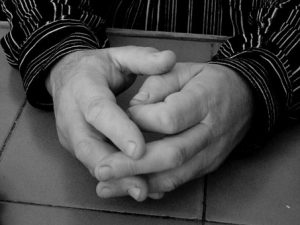Saturday
Featured StoriesRude Awakening or Good Grief
Using dharma and expressive arts to relate with transition when your role as caregiver is over
by Andrea Sherman and Marsha Weiner
 There’s a profundity to caregiving.
There’s a profundity to caregiving.
Caregiving demands that we make sacrifices of our time and resources. If we yield to the process of caregiving, compassion in action can become a spiritual discipline, opening doors of insight. It can reveal the remarkable power of compassion, through the practice of loving-kindness meditation, tonglen and more.
But eventually your role as a caregiver will come to end.
 The person you are caring for may get well, and with dynamic willingness re-enter the stream of life. In that fortunate scenario, what you experienced as a caregiver may recede as a loving and intimate memory, as you integrate into your life the spiritual fruits you have gathered. But we all know another scenario is also possible; the person you have been caring for may die. When that happens, the caregiver is often left with a unique avalanche of feelings, sometimes conflicted, always deep and often cloaked in grief.
The person you are caring for may get well, and with dynamic willingness re-enter the stream of life. In that fortunate scenario, what you experienced as a caregiver may recede as a loving and intimate memory, as you integrate into your life the spiritual fruits you have gathered. But we all know another scenario is also possible; the person you have been caring for may die. When that happens, the caregiver is often left with a unique avalanche of feelings, sometimes conflicted, always deep and often cloaked in grief.
There are bookshelves chock-a-block full of books about grief and grieving. People have written beautiful memoirs that provide islands of comfort and inspiration; there are “how-to” books that chart the course of loss. There is a wide range of devotional books brimming with prayers and meditations, offering guidance for the seeking soul.
 In tandem with the torrent of loss and grief, the ending of one’s caregiver role offers unique opportunities for dharma practice and growth. After all, if you’ve embraced caregiving as compassion in action, as a spiritual discipline, there may be fruits to harvest. The predicament is, how to remain open to the moment, when the moment is steeped with grief to a level that leaves you feeling separate, isolated, lost, angry. You may possibly feel betrayed, or at least have a sense of being adrift.
In tandem with the torrent of loss and grief, the ending of one’s caregiver role offers unique opportunities for dharma practice and growth. After all, if you’ve embraced caregiving as compassion in action, as a spiritual discipline, there may be fruits to harvest. The predicament is, how to remain open to the moment, when the moment is steeped with grief to a level that leaves you feeling separate, isolated, lost, angry. You may possibly feel betrayed, or at least have a sense of being adrift.
Journalist, screenwriter, humorist and memoirist Nora Ephron used to quote her mother Phoebe Ephron, who always told her “Everything is copy.” She meant that one’s ups and downs are fertile material for writing and creating, and for shining light on the breadth and depth of human experience, even the deepest of losses. In that spirit, we’d like to suggest that the expressive arts have much to offer when your role as a caregiver is over, even when in the depths of your grief.
 There are many expressive forms: writing poetry and prose, theatrical arts (including music and dance), visual arts such as painting, drawing, coloring, sculpting, making collages and assemblages. Cooking and gardening are also expressive. When combined with contemplative practices, the expressive arts give form and breath to feelings; they present opportunities to use those feelings to bring you back into the moment.
There are many expressive forms: writing poetry and prose, theatrical arts (including music and dance), visual arts such as painting, drawing, coloring, sculpting, making collages and assemblages. Cooking and gardening are also expressive. When combined with contemplative practices, the expressive arts give form and breath to feelings; they present opportunities to use those feelings to bring you back into the moment.
Here’s how it worked for me. [Andrea Sherman]
Seven years ago I lost my father. As accomplished as he was, as loved as he was by our family and a broad community of friends and colleagues, he was also suffering for years from a series of chronic conditions. At 87 years of age he made a conscious decision to die. He chose to stop taking all of his medications, and to be at home, to listen to his favorite music, sip diet coke, and spend his remaining conscious time surrounded by family: his beloved daughters, and their equally beloved spouses.
 I adored my father. We shared a deep spirituality and a love of poetry and music. We spent many, many hours talking and sharing on that level, so I understood his choice, and I was prepared to honor it. But I was unprepared to accept a new reality. I was unprepared for what life would feel like without him. That was a rude awakening. I missed hearing his voice, and I missed his warmth. I also missed his true wisdom, which had been forged through a lifelong commitment to social justice, and expanded by his enormous compassion for humanity.
I adored my father. We shared a deep spirituality and a love of poetry and music. We spent many, many hours talking and sharing on that level, so I understood his choice, and I was prepared to honor it. But I was unprepared to accept a new reality. I was unprepared for what life would feel like without him. That was a rude awakening. I missed hearing his voice, and I missed his warmth. I also missed his true wisdom, which had been forged through a lifelong commitment to social justice, and expanded by his enormous compassion for humanity.
This was inescapable grief, and I did not have the means to express the deep, profoundly raw and sad feelings I struggled with while trying to accept that my father was gone. In that separate sense of time and space mourners often find themselves in, I began to collect images — words and pictures that captured my attention. They captured my attention because they reminded me of him.
 The word “gone” and the picture of a record (yes, vinyl!). Pictures of a bowtie and a hat that could have come right out of his closet. Images like these began to litter my desk. I’d clip out more words: “vanishing,” “anywhere,” phrases such as “keep smiling,” the word “father.” As I moved the images and words around, I moved through my feelings. Juxtaposing words and images helped bring some design to my sadness. Sweet memories would continue to rise in waves along with the tears of being bereft, then smiles as I remembered his antics and his immense appetite for practical jokes
The word “gone” and the picture of a record (yes, vinyl!). Pictures of a bowtie and a hat that could have come right out of his closet. Images like these began to litter my desk. I’d clip out more words: “vanishing,” “anywhere,” phrases such as “keep smiling,” the word “father.” As I moved the images and words around, I moved through my feelings. Juxtaposing words and images helped bring some design to my sadness. Sweet memories would continue to rise in waves along with the tears of being bereft, then smiles as I remembered his antics and his immense appetite for practical jokes
Over the next few weeks of moving around words and images I ended up with a series of collages. Through collage I was able to give form, voice and movement to the deep feelings of grief and loss. Giving them voice lit a light on the path back within. As I re-embraced my practice I came to understand what I had once read about; I was able to bow to my grief.
Loss can be a rude awakening. While caregiving we’ve fine-tuned ourselves to be responsive, to anticipate the needs of the person we are caring for, right down to the subtlest degree. When that resonance of intimately responding to another is suddenly gone, the reverberation can be rude and harsh. It’s easy to feel suddenly alone, lost, and separate.
 Avail yourself of the expressive arts to help integrate your caregiving experiences. In keeping with the non-judgmental approach of meditation, your creative expressions are not to be evaluated or judged. There is no contest in this practice, no comparison, no winning and losing. Practiced in this way, expressive arts can bring you back into the moment. The arts can transform a rude awakening into a “good grief.”
Avail yourself of the expressive arts to help integrate your caregiving experiences. In keeping with the non-judgmental approach of meditation, your creative expressions are not to be evaluated or judged. There is no contest in this practice, no comparison, no winning and losing. Practiced in this way, expressive arts can bring you back into the moment. The arts can transform a rude awakening into a “good grief.”
Andrea Sherman and Marsha Weiner created Seasons of Care, a selfcare program for caregivers using the contemplative and expressive arts. They are currently working on a book about harvesting the spiritual fruits of caregiving. Andrea is on the Shambhala Working Group on Aging and Co-Chairs Conversations on Aging at NY Shambhala. Marsha leads informal meditation groups, including groups for people in recovery.
Editor’s Note: This is the final installment in our series on Dharma Tools for Caregivers. Andrea and Marsha are working on a book about harvesting the spiritual fruits of caregiving. You can follow them @SeasonsOfCare.
Images courtesy of Pixabay
















